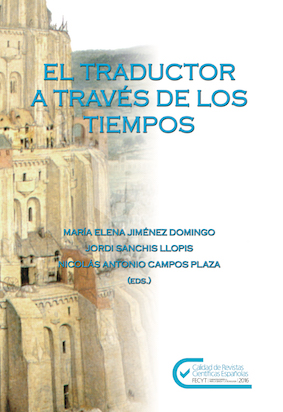El traductor com a transmissor de la nostra Història: Adoración Elvira i la traducció de la metàfora novedosa de l'escritor Agustín Gómez Arcos
DOI:
https://doi.org/10.7203/qfilologia.21.9310 Resum
Resum
En aquestes línies m'agradaria posar en relleu la importància que té el treball dels traductors literaris quant a transmissors de la nostra història. La labor del traductor literari tendeix a exposar-se únicament des de paràmetres d'efecte, fidelitat, musicalitat, literalitat, literarietat, adaptació, domesticació, etc. deixant habitualment de costat l'estudi de la temàtica de les obres traduïdes.
Com a fonament d'aquest article recorreré a dues novel·les d'Agustín Gómez Arcos i, concretament, a la traducció de diverses metàfores noves, del francès al castellà, realitzada per la professora Adoración Elvira Rodríguez.
Paraules clau: traducció literària; història d'Espanya; metàfores.
 Descàrregues
Descàrregues
Descàrregues
Publicades
Com citar
-
Resum835
-
PDF (Español)506
Número
Secció
Llicència
 Este obra está bajo una licencia de Creative Commons Reconocimiento-NoComercial-SinObraDerivada 4.0 Internacional.
Este obra está bajo una licencia de Creative Commons Reconocimiento-NoComercial-SinObraDerivada 4.0 Internacional.
Tots els documents inclosos a OJS són d'accés lliure i propietat dels seus autors i/o institucions editores, i per tant, qualsevol acte de reproducció, comercialització, comunicació pública o transformació total o parcial necessita el consentiment exprés i escrit d'aquests.
Authors who publish with this journal agree to the following terms:
- Authors retain copyright and grant the journal right of first publication with the work simultaneously licensed under a Creative Commons Attribution License that allows others to share the work with an acknowledgement of the work's authorship and initial publication in this journal.
- Authors are able to enter into separate, additional contractual arrangements for the non-exclusive distribution of the journal's published version of the work (e.g., post it to an institutional repository or publish it in a book), with an acknowledgement of its initial publication in this journal.
- Authors are permitted and encouraged to post their work online (e.g., in institutional repositories or on their website) prior to and during the submission process, as it can lead to productive exchanges, as well as earlier and greater citation of published work (See The Effect of Open Access).



